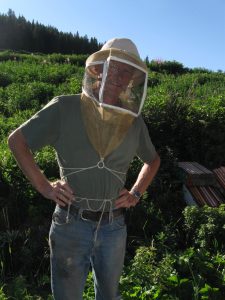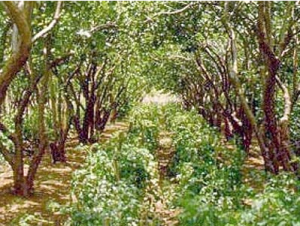
Ed Colby
Get On Board!
coloradobees1@gmail.com
By: Ed Colby
Good Luck, Bad Luck.
Despite a fire ban here in western Colorado, on July 3 some yahoos shooting illegal tracer rounds at the Basalt rifle range set off a wildfire. So far it’s burned three homes, one of Derrick’s apiaries, and over 6,000 acres. They brought in 450 firefighters, including hot shot crews from Oregon to do the dirty and dangerous ground work, while helicopters drop water and slurry bombers lay down retardant. Five hundred homes in and around Basalt got evacuated. As of this writing, on July 10, the blaze is 40 percent contained and expected to burn for weeks.
The unintentional arsonists are a couple of dumb kids, if 23 is still a kid. To me they’re kids. Now some of the good citizens of Eagle County are demanding that these unfortunates be drawn and quartered. I get this. I also get it that kids pull some real bonehead stunts. I did a few things I’m not too proud of. I closed the bar more than once, but I never killed anybody on the highway, and I never spent the night in jail. Just lucky, I guess.
Unfortunately, you can’t undo the past. Now those fire starters have to pay their debt to society. But it could have gone the other way, you know. They could have fired those tracer rounds and not started a fire. But their luck ran out.
I’m sorry about Derrick’s bees. He didn’t deserve this. When I worked for Paul, a cheat grass fire scorched a hillside and so thoroughly destroyed a bee yard that you couldn’t tell that bees had ever been there. The only evidence was a handful of nails and a few metal hive parts.
Our local fire ban extends not only to campfires but to charcoal grills, fireworks and outdoor smoking. In all the public service announcements, nobody’s said a thing about bee smokers.
Without smoke, honey bees can be difficult. Without it, I work carefully and try to do just the minimum, i.e., pop a lid, put on a super, and don’t dig around too much. Gloves help.
You don’t want to tempt fate and light your smoker when there’s a fire ban. I won’t say I’ve never done it, because sometimes bees need smoke. But that doesn’t make it right. Around here, cheat grass takes over non-irrigated land and crowds out everything else. It starts out green in the spring, then dries out and turns brown by mid-summer or even earlier. When it’s fully cured it burns like gasoline.
So you wouldn’t want to drop your smoker in some cheat grass and have the lid pop off and embers spill out. If you started a fire, you’d be as guilty as those kids at the rifle range. You, salt-of-the-earth-good-guy beekeeper! The press would crucify you. You might make national news. And of course you’d have the rest of your life to kick yourself.
Fires and smokers aren’t my only problems. A bear breached a solar-powered woven-wire electric fence the other night. He knocked over four hives but only ate a couple. Interestingly, he hauled the brood supers out of the yard and scraped off the brood and honey outside the apiary perimeter.
After I cleaned up the mess, Pepper the blue heeler and I spent the night in the car next to the bee yard. I fell asleep about 10:30, and at 11, Pepper growled. I didn’t hear or see anything outside, but in the morning I found where the bear had pushed down the fence at the same location where he climbed over before.
The next thing I did was buy a voltmeter. I’d been checking the fence the cowboy way – holding a blade of green grass and touching it to the fence to feel for a shock. Clearly the cowboy way didn’t work. When I used my new voltmeter to check the fence, it read 4,500 volts. Five thousand is considered minimum to keep out a bear.
For a good electric fence you need a good ground connection. Let’s say you inadvertently touch the fence. You feel the shock as the electric charge passes through you into the earth, thence to the ground rod, and back to the charger. Complete circuit, and you’re part of it. Dry earth makes a poor connection from you or an animal to the ground rod and is often the reason fences sometimes don’t keep out bears.
I used the weed eater to clear out the weeds and cheat grass under the fence. Then I laid chicken wire on the ground around the outside of the bear fence and wired it to my series of ground rods. This meant that the bear would have to stand on the grounded chicken wire to climb over the fence again. My fence pop went up to 5,500 volts.
The Parks and Wildlife officer came by to take a look. In Colorado, the state reimburses beekeepers for game damage if the apiary has an electric fence. He sent me the paperwork to file a claim. The state pays $200 for a destroyed hive, but I’d rather have my bees back.
The bear hasn’t returned, so far. It’s been 10 days. The incident was my fault, really, but I’m getting compensated for it. I guess I’m just plain lucky.
As of August 8, the fire had burned 12,588 acres and was 90% contained.
Ed Colby practices beekeeping in Aspen Mountain, Colorado, where he lives with his partner, Marilyn.









